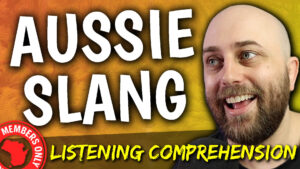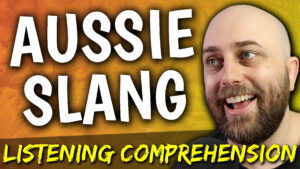
AE 988
How Cockatoos Are Mastering Dumpster Diving with Dr. John Martin
Learn Australian English in each of these episodes of the Aussie English Podcast.
In these Aussie English Interview episodes, I get to chin-wag with different people

In today's episode...
Learn Australian English in this episode of the Aussie English podcast!
One of the reasons I love doing podcasts is because I get to interview and chin-wag with people.
I am so proud to introduce you to Dr. John Martin of the Taronga Institute for Science and Learning!
Dr. Martin of Taronga Zoo recently got his research paper published in Science, the prestigious science magazine.
Together with his team, the paper titled “Innovation and geographic spread of a complex foraging culture in an urban parrot” talked about these cockatoos who have mastered dumpster diving. Kind of like the bin chicken, isn’t it?
If you want to help their team observe these clever birds, check out this app so you can help them in their research. I also recommend you to learn more about The Clever Cockie Project!
Follow the lovable Australian cockatoos via these links on:
Facebook: WingTags
Instagram: @wingtags
Twitter: @wingtags
You can always reach out to Dr. John Martin via his links here:
Facebook Group: Urban Field Naturalist
Instagram: @urbanfieldnaturalist
Twitter: @UrbanFieldNats
Naturalists Blog
Improve your listening skills today – listen, play, & pause this episode – and start speaking like a native English speaker!

Watch & listen to the convo!
Listen to today's episode!
This is the FREE podcast player. You can fast-forward and rewind easily as well as slow down or speed up the audio to suit your level.
If you’d like to use the Premium Podcast Player as well as get the downloadable transcripts, audio files, and videos for episodes, you can get instant access by joining the Premium Podcast membership here.
Get more out of every episode!

Premium Podcast members get access to...
- All 900+ podcast episodes including member-only episodes
- Member-only episode video lessons
- Downloadable transcript PDFs & audio files for every episode

Recent Episodes:


AE 1360 – 20 English Idioms Explained | Members Only

AE 1359 – 20 English Idioms To Transcribe

AE 1358 – How to Pronounce -ED Endings in Australian English [Members Only]

AE 1357 – How to Pronounce -ED Endings in Australian English

AE 1356 – Will AI Save Us Or Replace Us?

AE 1355 – 20 Aussie Slang Sentences Explained [Members Only]

AE 1354 – 20 Aussie Slang Sentences to Transcribe

AE 1353 – The Goss: How the Australian Property Market Got Cooked!

Share

Join my 5-Day FREE English Course!
Complete this 5-day course and learn how to study effectively with podcasts in order to level up your English quickly whilst having fun!


Have you got the Aussie English app?
Listen to all your favourite episodes of the Aussie English Podcast on the official AE app.
Download it for FREE below!


Want to improve a specific area of your English quickly and enjoyably?
Check out my series of Aussie English Courses.
English pronunciation, use of phrasal verbs, spoken English, and listening skills!

Have you got the Aussie English app?
Listen to all your favourite episodes of the Aussie English Podcast on the official AE app.
Download it for FREE below!



Want to improve a specific area of your English quickly and enjoyably?
Check out my series of Aussie English Courses.
English pronunciation, use of phrasal verbs, spoken English, and listening skills!
Leave a comment below & practice your English!




Responses
Cheeky flex ? Please explain. Thanks Pete
Hey Huu, if you “flex” it means to show you muscles. And so it can be used informally to mean that you’re showing off, often by mentioning something in conversation “I’ve got a Ferrari” – showing you’re rich, you’re flexing.